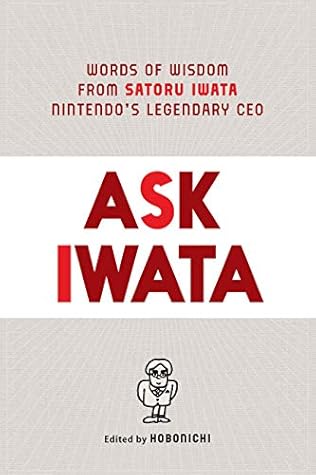More on this book
Community
Kindle Notes & Highlights
by
Satoru Iwata
Started reading
January 5, 2025
Ask me what sort of company I would want to work for, and I would say “A place where my boss understands me” or “A place where my boss cares about my quality of life.”
I first read this after getting fired from a job of almost 11 years and it drove home just how I felt with the whole situation. This was an experience that left some scars but they are starting to heal, thank goodness. This still resonates with me as I navigate my career options.
Without mutual sympathy and understanding, I see no point in this kind of dialogue. Which is why if someone had complaints, I made sure to hear them out. However, as I listened to what they had to say, I would always speak up when I had something to say myself.
Since my background is in development, I am better able to understand the mind of someone working in development than the average executive.
What are our strengths? What are our weaknesses? Management means figuring this out and leading the company in a direction that helps everyone’s strengths flourish and keeps their weaknesses in check.
The number of things we should be doing is always greater than what we can actually do. If you try doing everything on your list, you’ll only wear yourself out.
From there, unless we can win people over, improving products so much that people pick them up and smile, we’ve failed. It’s not enough to make a big splash and move units. Unless you can come up with something new six months or one year down the line and make customers say, “Wow, before I knew it I was playing all the time,” you’re done. If you fail in that respect, you haven’t actually accomplished your objective.
Since shocking people involves undermining what the customer expects, it requires determination. Take the Nintendo DS. At first, lots of people were confused. When we announced, “We’re going to release a console that has two screens and a touch panel,” most people must have thought, “Nintendo has gone off the deep end!”
In my experience, there are two types of interviewers: those who make a person feel at ease in order to get a sense of who they really are and judge their candidacy accordingly, and those who believe an unrelaxed person, though unable to speak their mind, will reveal all kinds of things about themselves, like how sociable or strong they are.
When I am *being* interviewed, I definitely appreciate the first approach rather than the second. It helps with my anxiety a bit and I rarely feel as if I truly messed up during the interview regardless of whether I get the position or not.
When I’m speaking with somebody at the company for the first time, I begin by asking, “What made you decide to join Nintendo?” Because this is a question anyone can answer. Whatever the case may be, they’ll have some kind of reason, and since the question is about them, there’s no wrong answer. They can tell it like it is and speak the truth, giving you a glimpse of their true nature.
Apart from “What made you join the company,” there’s another question I like to ask: “Out of all the work you’ve done so far, what was the most interesting thing? And what was the most painful?”
What determines whether somebody can listen to criticism and take it in stride probably has to do with the purity of their motivations and behavior, and their lack of bad intentions. It’s not about whether or not they can take a hit. Another key factor is that even when you criticize them, they recognize that it’s not a personal attack. I think that having this shared trust is why you can safely give them negative feedback.
If you can figure out what matters most to someone you can safely critique their work, but unless you have a sense of their values, you run the risk of unintentionally trampling over their feelings and priorities.
To put it simply, whenever possible, I want to assign work to those who actually want to do it. It’s only natural. Who wants to ask someone to do something important if they don’t seem to care?
Work is tough, full of unpleasant tasks. Some degree of perseverance is essential.
Depending on how you approach it, work can feel dull. But, if you’re able to find the fun in discovering new things, almost everything you do can become interesting. This realization can be a major turning point in enjoying your job.
No job is ever done alone. Someone else will always play a role. Companies provide a structure that allows for a variety of individuals to pool their efforts and accomplish huge tasks that could not be done alone.


